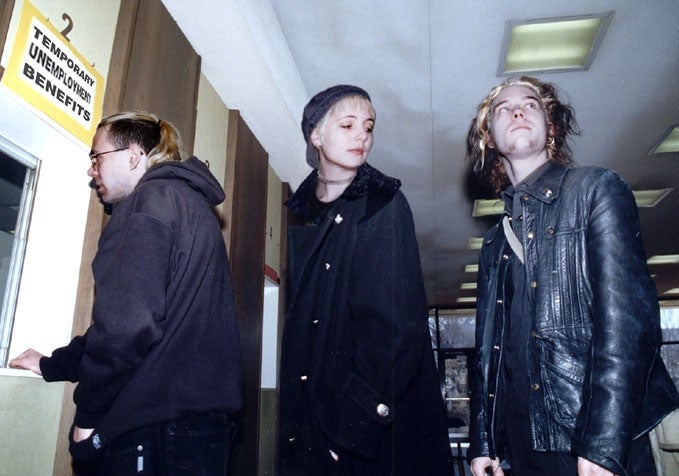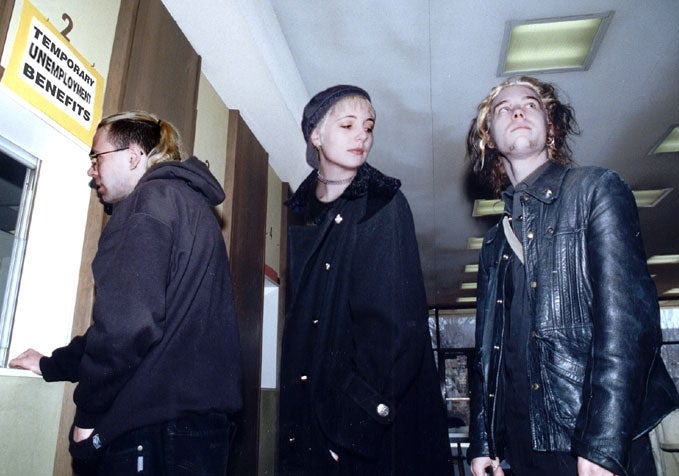WASHINGTON, DC—With first-quarter Club Rotation Index figures the lowest in seven years, and imports outselling domestic 12-inches more than two-to-one, economic observers throughout the U.S. are sounding the alarm over the nation’s rapidly declining techno-industrial base.

“America faces a grave moment of crisis,” said DJ Nathan Brackett, Secretary of Industrial and Hardcore, in a recent speech before Congress. “Vinyl imports from both Europe and Japan are threatening our nation’s once-great techno-industrial power base. Our Gross National Beats Per Minute is at its lowest point since 1991. The message is clear: We must fuck up the mix, or all is lost.”
In its late-’80s/early-’90s heyday, America’s techno-industrial complex seemed unstoppable. Led by such formidable powers as Nine Inch Nails and Ministry, the U.S. achieved near-total dominance of the global dance-mix marketplace. Even in the traditionally insular Eurodisco field, the loud, banging, clamorous sound of American-made techno strongly influenced such foreign industrial powers as Front 242 and KMFDM.
Less than a decade later, however, the glory days of the American techno-industrial complex seem far away. With over 20,000 former clubgoing elite out of work in the warehouse district of Chicago, and the Detroit house scene over $7 billion in debt, bitterness over the nation’s eroding techno-industrial base can be felt throughout its once-thriving industrial centers.
And with the rise of such overseas dope on wax as drum ’n’ bass, ambient and jungle, the problem, experts say, is not going to go away any time soon.
In fact, many fear that foreign competition from such heavy-hitting imports as England’s Prodigy and Chemical Brothers, Germany’s Atari Teenage Riot and Japan’s DJ Krush—whose rare vinyl imports fetch up to $29.99 domestically, even for a remix track—will overtake America’s floundering techno-industrial base by the year 2000.
Many, including NYC illbient’s DJ Spooky, contend that fault lies in American industrial’s inability to adapt to the changing realities of modern times.
“We must retool America’s angry, metallic, hard-edged industrial mix to better reflect the mellowtronic, groovadelic peace memes of the emergent global cyber-age,” he said.
California’s DJ Shadow agreed. “We are being beaten at our own game. Trip-hop was invented here, but right now, the British are simply doing it better,” he said. “America has got to seriously remix its priorities.”
In the face of the foreign dance-floor dominance, President Clinton is urging Congress to pump money into the revitalization of the nation’s techno-industrial infrastructure.
“It is not enough to say, ’We must drop bass.’ It is not enough to say, ’We must rock the crazy beats,’” President Clinton said Monday in a secret live appearance at D.C.’s famed underground The 930 Club. “If American techno is to become the world’s leader once again, we must drop much bass; we must rock mad, phat-ass, crazy beats; and we must do so quick-fast in a hurry, 24-7, 365. And I am out.”
Many conservatives in Congress, however, oppose to such change. “U.S. techno-industrial is hardcore, and it must stay hardcore,” said Sen. Orrin Hatch (R-UT). “Would Al Jourgensen wear a T-shirt depicting smiley aliens telepathing ’Love’ to their baggy-pantsed children? Techno should be about hate, not love. Techno is about wearing black and screaming, not standing in one place and swaying peacefully. I say, bring back the days of Skinny Puppy.”
“Techno? Industrial? I am not familiar with these strange terms,” said Rolling Stone magazine’s Jann Wenner, speaking from one of his boats. “I do understand, however, that something called ’electronica’ is the Next Big Thing. It says so right on the cover of our latest issue.”







